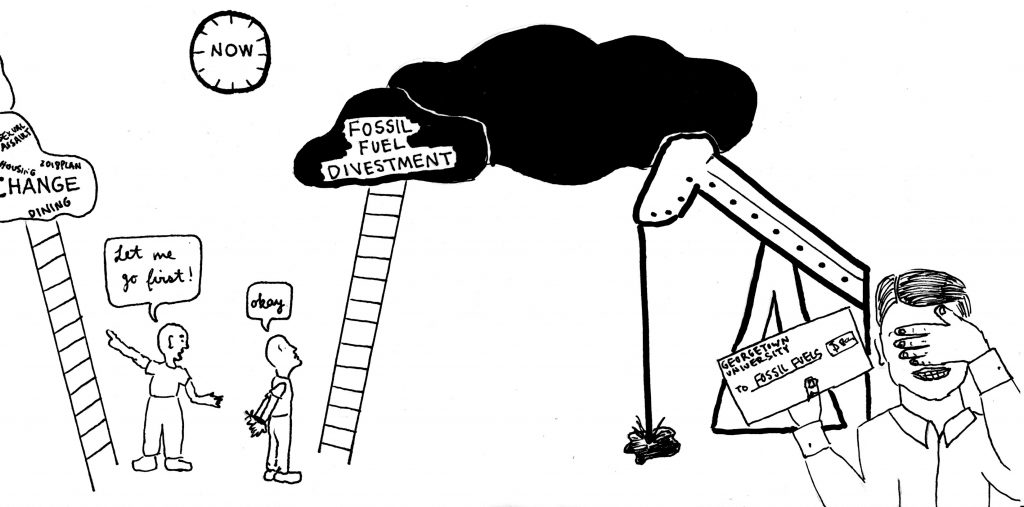There is no doubt that climate change is one of the pivotal issues of our generation. But along with twelve of my colleagues in the GUSA Senate, I voted against holding a referendum to ask the student body whether Georgetown should divest its endowment from fossil fuel companies. Divestment would demonstrate our commitment to protecting the environment, but a referendum on divestment at this time would be futile at best and counterproductive at worst.
GUSA has held a nonbinding referendum twice in recent memory. In the spring of 2012, the Disciplinary Review Committee composed of students, faculty, and administrators had recommended raising the evidentiary standard for Code of Student Conduct violations from “more likely than not” to “clear and convincing.” Despite support from GUSA and the Student Advocacy Office, Todd Olson, the administrator responsible for making the change, continued to limit student engagement. The following September, the student body voted overwhelmingly in favor of raising the standard, and three weeks after the referendum, Dr. Olson raised the evidentiary standard for on-campus incidents.
The following year, the University proposed housing students in satellite dormitories, potentially as far as Arlington, Virginia, to meet housing requirements mandated by the 2010 Campus Plan. The GUSA President and his chief of staff joined with other student leaders to place a referendum on the ballot in time for the September GUSA Senate elections in which 93 percent of students opposed a satellite campus. One month later, administrators took the option off the table and opted to renovate the former Jesuit Residence instead.
The referenda in 2012 and 2013 both addressed pending decisions in which administrators had previously ignored or dismissed student concerns. Although the Disciplinary Review Committee had recommended raising the evidentiary standard, Dr. Olson had yet to make his final decision when the referendum was held. Likewise, the satellite campus proposal was in its conceptual stages when the “One Georgetown, One Campus” campaign mobilized against it. Fortunately, administrators chose to side with students when the referenda showed a united student body.
In contrast, the Board of Directors has already made its decision about divestment. The Committee on Investments and Social Responsibility rejected GU Fossil Free’s proposal in January in favor of divesting only from the coal companies with the most detrimental impact on the environment. The Board of Directors then established a working group, which affirmed the recommendation despite input from Fossil Free, before unanimously agreeing to the working group’s watered-down version of divestment.
While Fossil Free was understandably disappointed, they were unable to convince the GUSA Senate that a referendum would persuade the Board of Directors to reconsider their decision. If Fossil Free’s tireless advocacy and a petition signed by over 2,500 members of the community did not convince the Board that there was broad support for divestment, it remained unclear to me how a survey run by GUSA would change their minds. During previous referenda, student input had the potential to be the tipping point in the decision-making process; asking the University’s governing body to reopen a matter it recently settled and to reconsider a proposal it already rejected is unlikely to succeed.
A referendum is one of many options student leaders use to pressure and persuade administrators to adopt policies favorable to students. It is not a poll, but an advocacy tool, best used when the question is salient and the student body is united. Previous outcomes have shown that administrators do care about the results of these referenda, but if GUSA employs them too frequently and administrators ignore the results, they may lose their legitimacy.
Moreover, the timing of the vote—concurrent with the election of the next GUSA President and Vice President—would no doubt focus the campus conversation on divestment at the expense of other concerns, as happened in previous years. Divestment is an important issue, but it is one of many, along with sexual assault, off-campus conduct reform, the 2018 Campus Plan, sustainability, student safety, club funding, dining, and mental health, among others. The Senate was concerned that a renewed focus on divestment, an already finalized decision, would divert the student body’s attention from other issues where student input could be crucial in that ensuring administrators make decisions that align with student interests.


As a member of the Speech and Expression Committee and an advocate for free speech, I am disappointed that Fossil Free criticized GUSA’s decision on free speech grounds, comparing this vote to “censorship.” GUSA did not foreclose further discussion, as Fossil Free has suggested, but merely opted against administering an official poll of the student body. Fossil Free retains access to the same means of dialogue and communication that are open to every student group and were effective in bringing attention to divestment in the first place.
GUSA has long believed that divesting from fossil fuel companies is the right thing to do, which is why the Senate called for divestment in the fall of 2013. I hope Fossil Free continues its advocacy and that GUSA can remain a valued partner. But instead of prioritizing issues where our voices are least likely to have a tangible impact, let’s look to the future and focus on protecting student rights and ensuring that student life on the Hilltop is as rich and vibrant as possible.
Read this column’s paired Voices piece here.




